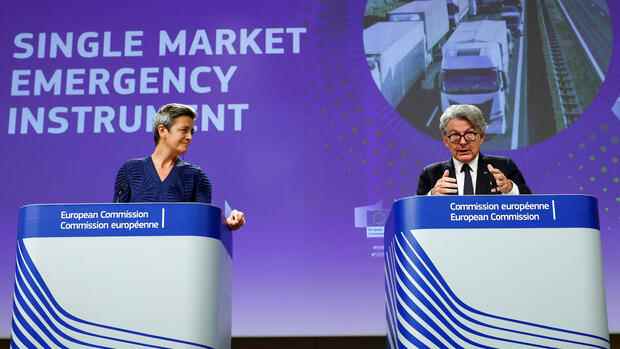EU Commissioners Margrethe Vestager and Thierry Breton presented the plans.
(Photo: Reuters)
Brussels The world was actually warned: 17 years before the corona pandemic, the first “Sars” virus infected thousands of people and gave an impression of what a new disease can do. The French government reacted promptly and planned, for example, to produce masks and protective clothing locally. But Parliament called it back. A waste of money, judged the people’s representatives.
When the second “Sars” virus spread in spring 2020, France was just as unprepared as its neighboring countries. Lockdowns, export bans and border closures brought the European single market to the brink of collapse.
Now the EU wants to learn the lessons and prevent it. The Vice President of the EU Commission, Margrethe Vestager, and the French Internal Market Commissioner, Thierry Breton, presented a traffic light system for better crisis prevention in Brussels on Monday.
“We must keep our internal market functioning at all times, even in a crisis,” said Vestager. “We need new instruments that allow us to react quickly and together.”
Top jobs of the day
Find the best jobs now and
be notified by email.
In detail, the “single market emergency instrument” works as follows:
- Green phase: In normal times, an advisory committee develops early warning systems and crisis plans, which are practiced with training. Each Member State may send one representative to the body, which is chaired by the Commission.
- Yellow phase: If there are indications of a crisis, the Commission can declare an alert level. It then assesses the risks and determines which goods and services are of strategic importance and where disruptions could occur. If an event occurs that could disrupt supply chains for strategically important goods and services, surveillance mode can be activated. Then the EU states would have to monitor production and build up strategic reserves. Companies would have to hold certain goods or at least have production facilities ready. The governments should report regularly to Brussels on how storage is developing – similar to what they are currently doing with gas. The states report monthly how the filling levels in the storage facilities are developing.
- Phase Red: As soon as harmful effects on the internal market are foreseeable, the EU Council can declare emergency mode with a qualified majority. This would require at least 15 countries with a total of 65 percent of the EU population. Then governments would be forbidden from imposing export bans on strategically important goods within the EU. Workers who produce such goods should also be allowed to move freely within the EU. Unlike in the first few weeks of the corona pandemic, the borders should not simply be closed.
At this stage, the Commission can also make binding specifications for companies: It can require companies to provide information about their production capacities and to switch production to “crisis-relevant” goods.
The company must either comply or provide good reasons why it cannot. “If a company says we can’t switch, we accept that and find someone else,” Vestager said. However, if the company agrees and then does not deliver, a penalty can be imposed. This can be up to 1.5 percent of sales.
Companies are protected against recourse claims from other customers whose orders have to be backlogged due to the emergency, as long as the contracts were concluded under EU law.
Companies complain about the planned economy
This is actually good news for the economy. Many companies had to stop production during the corona crisis because ordered preliminary products were stuck in border controls. It is clear today that better crisis management would have mitigated the recession.
The economy was not prepared for the need for masks, protective clothing and ventilators in 2020. Preliminary products for vaccine production were also missing.
(Photo: dpa)
But what the EU Commission intends to do is delicate. She wants to be given the right to intervene deeply in the decisions of companies. Above all, it is disputed that the Commission can order the production of “crisis-relevant goods” against the will of the producer. This order must then be carried out in preference to other orders.
Companies complain that the new emergency instrument goes far too far and interferes with private autonomy: “This type of crisis policy is a ‘no go’ because it permanently damages the reputation of Europe as a business location and the competitiveness of European companies,” said Thilo Brodtmann , General Manager of the Association of German Mechanical and Plant Engineering (VDMA). Reliability is essential for the industry.
Some critics even warn against the entry of the EU into the war economy. Breton has long attracted the suspicion of company representatives. The industry commissioner is suspected of wanting to replace the principle of the free market with French dirigisme.
>> Read here: Late start, lack of experts – the EU made these mistakes when buying the corona vaccine
Breton defended himself on Monday, pointing out that the US government could exercise much more coercion on companies in a crisis. Vestager emphasized that everything is done in close consultation with governments and companies. It was “anything but a planned economy,” she said. On the contrary, it is about ensuring that the market continues to function.
MEP Andreas Schwab (CDU) wants to dispel the concerns: “Companies will not be unduly burdened by this law,” he told the Handelsblatt. “It is progress if, in the event of a crisis, such decisions are made centrally in Brussels and not individually in all EU countries.” Companies must assume their responsibility and see themselves as part of crisis prevention.
The Chairwoman of the Internal Market Committee, Anna Cavazzini (Greens), also welcomed the Commission’s initiative. The emergency mechanism can balance the strengths and weaknesses of the member states through a common approach, she said.
More: EU bans all forced labor products
